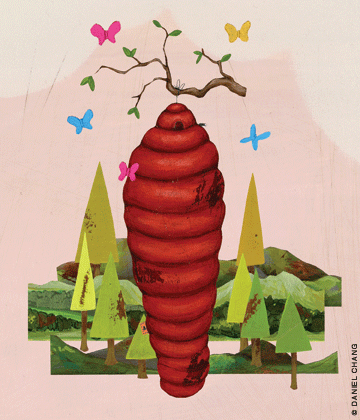
Taking group therapy way off the beaten path.
By Amy Cirincione
We rise at first light and kneel before each sleeping teenager. They have set up shelters and are nestled deep in their sleeping bags. We listen to them snore softly and watch the rise and fall of their chests. If they have rolled off of their sleeping pads, we gently nudge them back on. We complete these rituals every morning and every night because we care and because we worry.
They hate us.
They hate us not for who we are, but because of what we have done. We have taken them from their families, their friends, their schools, and their drugs. We have taken away their piercings, their iPods, and their cell phones. In exchange, we give them three weeks in the wilderness of the Pacific Northwest, a 40-pound backpack, and intensive drug, alcohol, and mental health counseling. This is wilderness therapy.
They hate wilderness therapy.
My clients are 14 to 17 years old. They are depressed, angry, anxious, and grieving. Sometimes all at the same time. They abuse alcohol, marijuana, methamphetamine, Oxycontin, Ecstasy, cocaine, and heroin. Sometimes at the same time. Someone in their life is desperate for them to change.
Every Sunday, a group of families meets in Albany, Oregon. For several hours, they recount how they reached a crisis point severe enough to make them willing to surrender their child to a team of therapists dressed in Gore-Tex and fleece. These meetings are often tear-filled and explosive. During one, I had to restrain a 16-year-old boy after he punched his father in the chest. When they end, the staff and teens pile into a van and drive into the mountains.
The teenagers spend their first few days feeling terrified and angry. They refuse to get out of their sleeping bags. They refuse to speak or to eat. They throw things. They call us Nazis. They try to run away.
Then something happens that I can’t quite explain. If you have ever seen a toddler wail and throw himself desperately on the ground during a temper tantrum, then you know that eventually he will exhaust himself and let you pick him up and rock him in your arms. Teenagers are not so different. After a few days of fighting, they are drained. They are homesick and overwhelmed. Some of them are experiencing chemical withdrawal. The wilderness has stripped them of their teenage stoicism and angst, revealing their vulnerability. They ask for help.
I become their surrogate parent, enforcing rules and consequences, teaching them to make a fire, and holding them when they cry out in pain they have buried for years under drugs, alcohol, and feigned indifference. The result is a powerful therapeutic alliance rooted in raw emotion and brutal honesty.
Surviving in the wilderness is hard. But when a teenager throws down his backpack in the middle of a hike, the challenge of finding the next water source is nothing compared to navigating the terrain of his fear, anxiety, and anger. Each time a teen reaches this point, he says, “You don’t understand. I can’t do this.”
The conversation always starts like this. For the next few minutes, or few hours, or few weeks, we bushwhack together through his head. What is he afraid of? What makes him feel overwhelmed? What does he need to feel safe? Compared to getting sober, learning to manage his depression without alcohol, and figuring out how to tell his father that he is afraid of him, this hike is just a walk in the woods.
Every day, they push harder and farther. My clients are more engaged in their treatment than those in any other residential program I have seen. They sleep and eat in solitude at their campsites. They hike in silence. They keep journals filled with their insights and goals. And because they are so often alone with their thoughts and feelings, when they come together around the fire we make our time and our words count.
“I’m afraid no one will ever love me.”
“I’ve been smoking weed for so long, I don’t know if I’ll ever be as smart as I used to be.”
“My mom makes me feel like I’m a broken toy that she needs to ship off to get fixed.”
“Everyone in my family gets high. I know I can’t stay sober if I go home.”
“I really admired the way you led our hike today. You made me push myself.”
“The last thing I said to my Dad was, ‘I hate you.’”
Around the fire and along the ridgelines, my clients retrace their footsteps, trying to understand how they ended up in the middle of nowhere in this unlikely family. They uncover childhood memories, write letters to estranged parents that they read and throw into the fire, and scream their secrets from the top of a mountain. They try to understand their painful love affairs with drugs. They begin to plan the first steps of their recovery.
When the three weeks end, our family dissolves. Some of the teens move on to boarding schools, some stay in the wilderness for more treatment, and some go home. On our last night together we sit in a circle and share our wishes. For themselves and one another, my clients wish for continued sobriety, reconciliation with parents, a chance to graduate from high school.
My wish for them is simple: I hope that they will remember this.
This summer I hiked with a group of teenage girls through a creek so densely overgrown that at times we could not see the water in which we were wading. We hoisted ourselves over fallen old-growth trees, winced as brambles tore at our skin, and balanced on slick river rocks. At the end of the day, we made camp along the water.
Our faces were streaked with sweat and dust and our boots were soaked. A tall girl with dark circles under her eyes turned to me and asked, “Where are we?”
I shrugged. “This place doesn’t have a name. It isn’t on any map. There’s no trail or road that leads to this place.”
The girl’s eyes widened, then narrowed. “Who else has been here?”
Again I shrugged. “No one. At least not for a long time.”
The girl examined me carefully. “So, we’re in a spot that’s basically impossible to reach?”
Her companions grunted in exhausted agreement but she continued speaking.
“We worked out butts off to get here. And I don’t know about you, but I really didn’t think we would make it,” she said. “But we did. So, I feel really proud right now. That’s all.”
Amy Cirincione SW’05 is a field therapist at Catherine Freer Wilderness Therapy Programs in Oregon. She may be contacted at [email protected].




